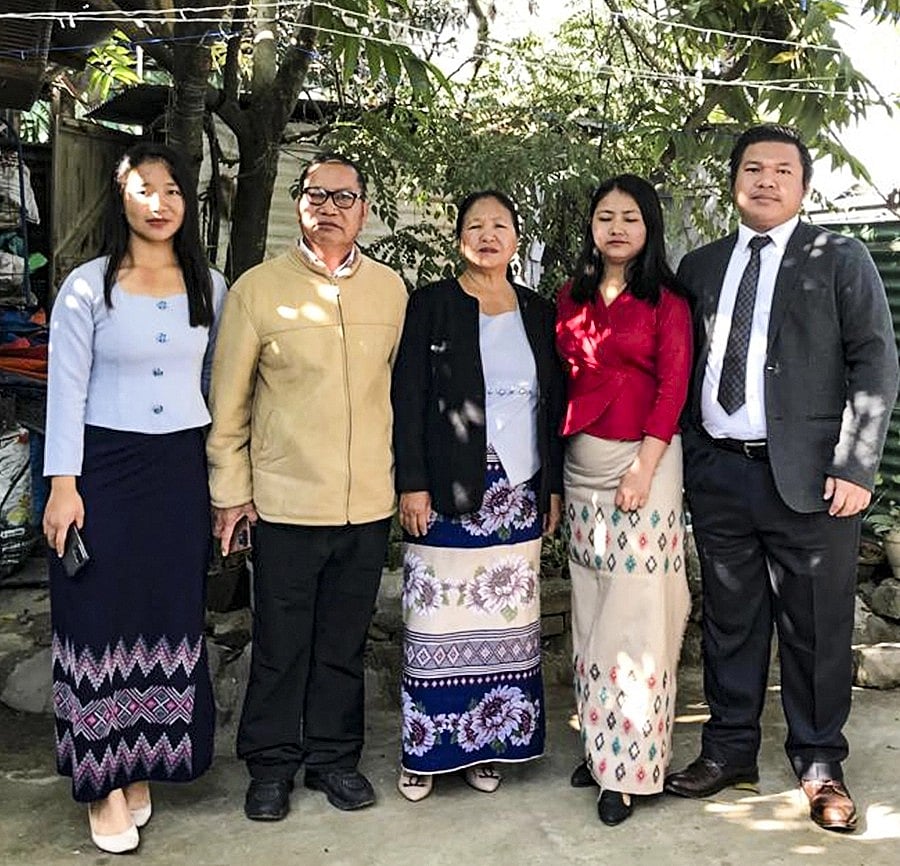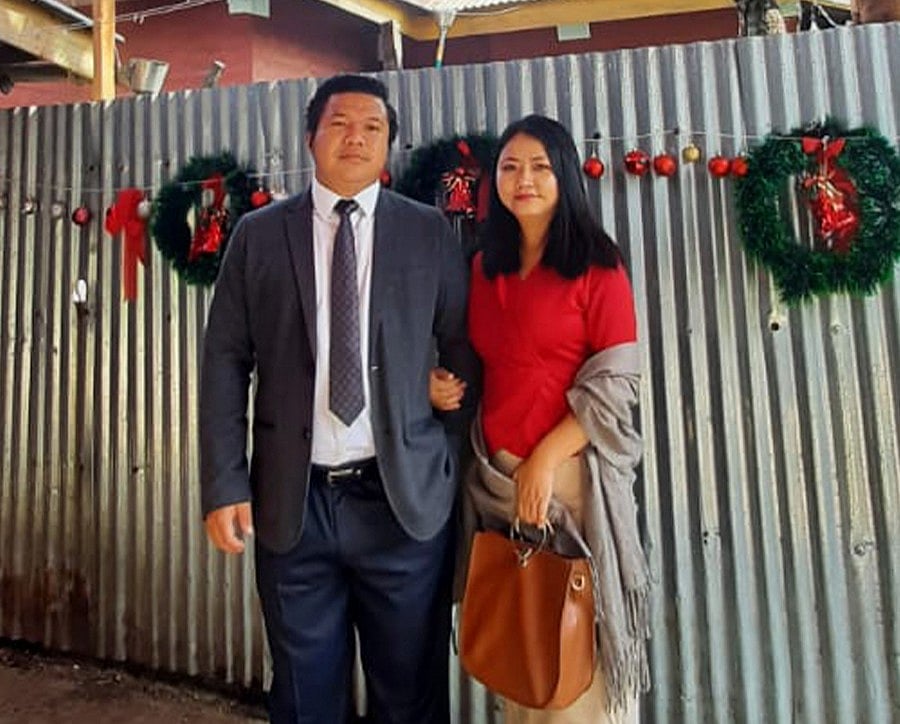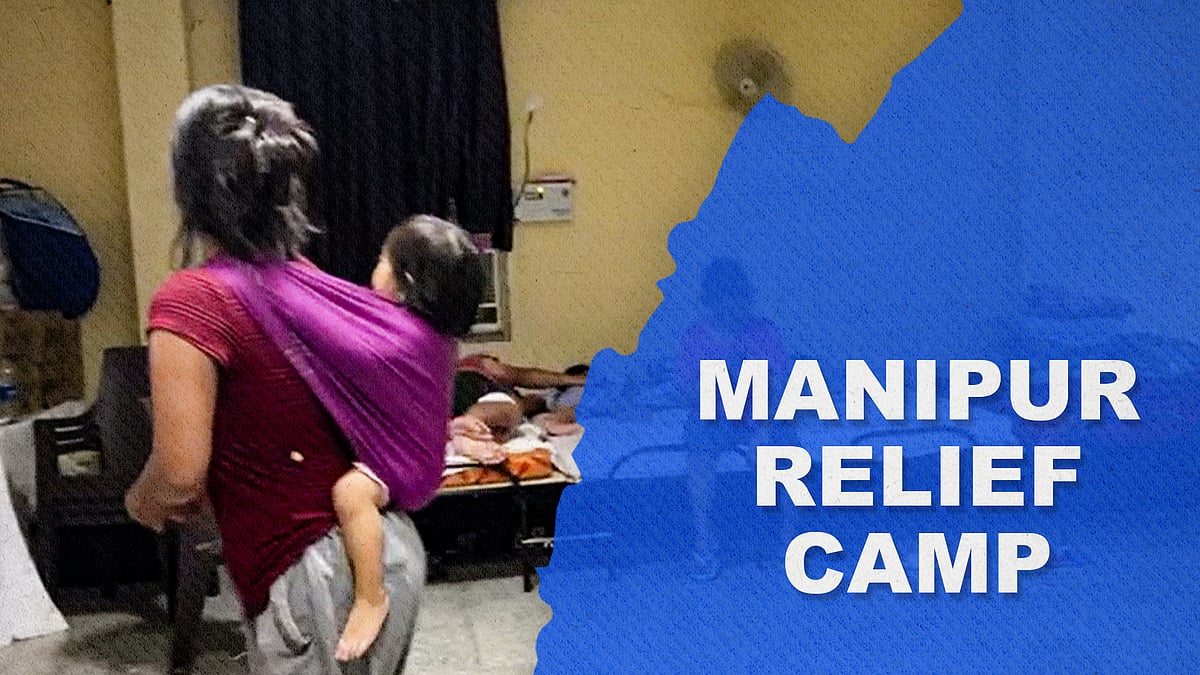‘Can still feel the blows...Imphal murdered my family’: Manipur violence survivor recalls escape
Jamngaihkim Gangte lost her mother, who was a government official, and brother in the ethnic violence.
May 3 was a typical day for 20-year-old Jamngaihkim Gangte. The skies were clear. She attended the classes at college, met friends and then returned to her home at Lamphel in Manipur’s Imphal West by afternoon.
Not long after, Jamngaihkim and her family found themselves in the middle of a storm that would wreck many lives in Manipur.
Over the next 24 hours, they would be chased by vindictive mobs, grilled for their ethnic identity, and compelled to lock themselves in a building’s terrace room for five hours before squeezing into a car’s boot to safety. By the end of this ordeal, they would witness unparalleled loss with the killing of Jamngaihkim’s mother and brother.
Her mother Gouzavung, 57, was an under-secretary with the Manipur government. The brother, Goulalsang, was 27 and had recently married.
The mob worked with clockwork precision: intercepting vehicles, identifying targets, incessant questioning, mobilising people by clanging metal objects in the street and intimidating journalists documenting the violence.
As violence erupted between the Meiteis and tribal Kukis in Manipur’s Churachandpur district on May 3, rumours of rape and murder had begun doing the rounds. This was preceded by a protest rally by All Tribal Students’ Union Manipur against the Manipur High Court’s direction to the state to consider Scheduled Tribe status for the dominant Meiteis. On May 17, the Supreme Court called the court’s decision “absolutely wrong”.
The violence that followed has killed more than 70 people so far. At least 200-plus have been injured and around 50,000 displaced. Earlier this week, chief minister Biren Singh claimed that 40 Kuki militants were shot dead in an operation led by security forces.

‘Most ministers live there’
Jamngaihkim’s family lived in the government quarters in Lamphel, with a mixed population of tribals and non-tribals. However, as the night grew darker on May 3 and the undercurrents of the tensions began spreading to the tribal dominated areas of Imphal, the family began to worry.
“We decided to stay overnight at a relative’s house in an upscale Langol area. The locality was safer as most ministers live there,” she said.
The relative’s house was not far: a 10-minute walk. Around 10 pm, the eerie silence in the dark street was breached only by quick steps of over three dozen feet, and occasional shouts and explosions at a distance.
The entire family returned to the government quarters on the morning of May 4 and decided to leave for the nearby CRPF relief camp, more than two km away. Around 8 am, Jamngaihkim’s brother Goulalsang drove his car to the camp to recce the area. His journey was without a hitch. There were no signs of a mob. Shops were shut. Streets were empty.
But the area would witness an upheaval in the span of the next two hours.
Goulalsang, who got married last year, was back and confided in the family that they should leave at the earliest as the camp was safe. They packed rice, vegetables, meat and documents in two cars. Jamngaihkim’s mother, brother, sister-in-law, cousin sister and aunt with a year-old baby squeezed themselves into their white Swift Dzire car. Seven other family members of her aunt packed themselves into another car.
The white car left first. Up to the next two km, the stretch was deserted. As the car took a right turn, Goulalsang saw a mob of 200-250 people. He reversed the car, but after a little chase, it was intercepted by a crowd near the deputy commissioner’s office. Seeing the car being hauled up by the mob from a distance, the second car reversed in time and took a detour.
The mob, comprising youths, middle-aged men and women, were armed with rods, bamboos, sticks, stones and bricks.
Jamngaihkim’s mother Gouzavung, under-secretary with the department of veterinary and animal husbandry services, told the angry faces, “We are Mizos not Kukis.” She showed her government identity card. No one listened to her. “They knew we were tribals because of our physical features,” Jamngaihkim told Newslaundry.
All of them were dragged out of the car. Its windows were smashed before setting it on fire. The mob snatched the video recording devices of journalists on the spot, she said.
The six were made to sit on a bench surrounded by the mob. Questions and abuses flew in from all directions: “Who are you?” “What’s your ethnicity?”
“By this time, my mother was already crying. She showed her government ID card and told them that she was under-secretary. A man in the crowd said they should let us go. But others disagreed and even questioned him for being sympathetic towards us. They asked him if he was related to us,” Jamngaihkim told Newslaundry.
As commotion ensued, another car diverted the mob’s attention. The crowd around Jamngaihkim’s family thinned. Seeing an opportunity, a Meitei man hid them in a house, not owned by him, in a nearby alley.
Jamngaihkim rang government and police helpline numbers, including 112. “There was no answer.”
Within five minutes, the crowd learnt about the hideout and converged in front of the house. The house gate was pelted with stones and struck by lathis. Seeing the damage to the property, the house owner asked the family to leave his room. The resistance to the crowd was short-lived. All were pulled outside – by hair. The crowd was thrilled.
Women rioters were forgiving. “They told us that we should be grateful that we were not getting raped like the Meitei women in Churachandpur. We are just beating you up. They asked my mother not to shed crocodile tears,” recalled Jamngaihkim.

Goulalsang, who was the last to be dragged out, was met with incessant blows to his head. Other family members were hit with rods, sticks and stones on the back. The baby was pushed around by women rioters.
“As I speak, I can still feel my back being hit by sticks and stones...At this time, we were separated and taken to the main road (where their car was burnt). I did not know where my family members were,” Jamngaihkim told Newslaundry.
On the road, a group of people circled around a battered Goulalsang. Gouzavung ran towards the group and flanked herself on the smashed head and body of Goulalsang. The hands holding sticks and rods did not waver. In the meanwhile, Goulalsang’s wife Nancy staggered towards the duo and covered them. She was promptly extricated.
“I saw my aunt with the baby and cousin. As the crowd was busy thrashing my brother and mother, two men from the Meitei community offered to take us to a nearby government compound for safety. The building was barely 200 metres away. I had a last look. My brother was perhaps unconscious. His head was dripping with blood. The crowd was cheering, clapping and celebrating as if it was some sort of an achievement. I could not help,” Jamngaihkim said.
After a pause, she said: “They did whatever they could do to my brother.”

‘Two Meiteis hid us, drove us to safety’
She dragged herself to the terrace of the government compound. The two Meiteis hid Jamngaihkim, her cousin and aunt with the child in a room and locked it from outside.
Within a few minutes, Jamngaihkim heard a few tear gas shells fired at the crowd. “Later, I was told that the police had picked up the two bodies. I instantly knew they were my mother and brother.”
The three would remain in the terrace room for the next five hours. The two men would go back to mingle with the crowd and return a few times to relay the ground chatter to the women. In the meantime, Jamngaihkim called several police officers, that her family had known, for help. “One of them said the police could not reach there because they would be outnumbered.”
Unlike the police, the Meitei men would neither give up nor give in. They brought snacks for the baby and the women. They planned and planned for the escape, as they said if the police came they would not leave unscathed.
“They told us they could also be in danger if it was found out that they were helping us. They said that a few men from the crowd saw us entering the compound so it was not safe for us to stay any longer. They feared that at night the compound would be attacked,” recalled Jamngaihkim.
The escape plan was decided. “We had no other option,” she told Newslaundry. The women along with the baby were squeezed into the boot of a car owned by one of the men around 6 pm. The music in the car was at full throttle to drown out the baby’s cries. In the boot, Jamngaihkim showed cartoon videos to the baby to calm him down. The drive was 10 minutes long. To them, it felt like forever. But the journey was smooth except a few head blows due to the speed bumps. “If caught, we would have been killed. We took a different route to reach another camp of Manipur Rifles.”

They reached the MR camp secured by paramilitary forces. Safe, but she was not at ease. Her sister-in-law Nancy was missing. She worked phones and found by midnight that Nancy was admitted to the ICU of Regional Institute of Medical Sciences in Imphal with head injuries and fractured wrists and fingers. She was later treated at AIIMS Delhi. Pictures show her scalp criss-crossed with stitches and both hands in cast.
Jamngaihkim, her cousin and her aunt with the child could not take chances and looked for a way out of the state. Flight tickets for Delhi for May 10 were booked. The army escorted them to the Imphal airport. “Facilities at the camp were not good and we heard rumours that a few Meiteis were trying to enter it. We were desperate to flee the state. We thought the airport would be safer,” said Jamngaihkim.
The women reached the airport four days in advance. However, the airport security only allowed entry to those who had a same day flight. Jamngaihkim edited the message about her flight details to change the flight date from May 10 to May 6 and gained entry to the airport. They spent four days at the airport, and subsequently flew to Delhi on May 10. Her sister-in-law reached the capital city on May 12 and was admitted to AIIMS Delhi. She was discharged last week.
Jamngaihkim’s father Leinboi Gangte, a sub-inspector, got a zero FIR registered at Churachandpur district. (At the time of the incident, he was in Churachandpur and could not travel to Imphal due to the violence.) Churachandpur SP Karthik Malladi confirmed that a missing persons’ report has been filed.
The bodies of Jamngaihkim’s mother and brother are still at the RIMS morgue.
In the family, Goulalsang would run errands, and pick and drop his mother to the office. Now, there won’t be any mother-son banter during drives or foolhardy arguments over dinner. They won’t be around to see the completion of their house under-construction now at Churachandpur.
Jamngaihkim feared that she may not continue her education in Imphal due to widening ethnic fissures. Her family has lived in Imphal for three decades. Though the parents wanted to spend their retirement life among their community in Churachandpur, for they had seen too many violent episodes in the 90s before the birth of their three children. But the siblings differed from their parents and saw a life in Imphal with better job and education opportunities, and other facilities.
Can Jamngaihkim call Imphal her home?
“Not any more. Imphal murdered my family. It took away everything we had. I would not call it home anymore.”
 ‘Faith in god, not govt’: Manipur survivors in Delhi say they were ‘forced to leave’ their homes
‘Faith in god, not govt’: Manipur survivors in Delhi say they were ‘forced to leave’ their homes